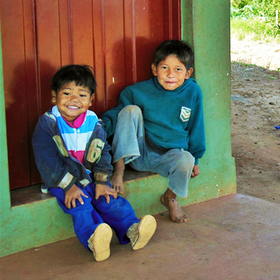"Anthroposophy helps me to understand my own culture!" - Juan, the 1st and 2nd grade Mbya teacher, expressed this gratefully during the two-week seminar with Daniel Hafner in the indigenous community of Ñamandu in the north of Argentina. Beforehand, we had talked together very intensively about re-embodiment and about why sometimes small children have to die. Juan discovered many parallels between the spiritual good of the Mbya and anthroposophy. For example, for the Mbya it is natural that the animals have all separated themselves from the first form of the human being. Not as a punishment, but as a reminder of the extremes to which man is capable of falling, they were created as archetypes. And these archetypes now send their shadows to earth - as animals.
With a new concern, we, Paula Kiefer and Elisabeth Rybak, travelled once again to Argentina, where six years ago we had founded a Waldorf kindergarten in the jungle for the children of the Mbya Guaraní. We were asked by the director if it would not be possible to imbue the whole school with Waldorf education. So we invited Daniel Hafner to give a seminar introducing anthroposophy and Waldorf education. During two weeks he worked with the six dedicated Mbya teachers in the mornings and in the afternoons he gave a course for all the teachers of the two small schools and some interested guests from the village. We also worked together on speech formation and eurythmy.
It became clear how well Waldorf education supports the world view of the Mbya and how far away this revolutionary education is from the classical Argentinean school system. Already in the past, we had often been the mediators between the white Argentinean teachers and the Mbya. And so we used the last month of our stay to build a bumpy bridge. No easy task in a country with various socio-economic problems that leave little room for a spiritual life. Teaching in the traditional school is primarily aimed at training citizens who celebrate the flag and the national heroes who were most famous for conquering the land and displacing the indigenous population. And all this is accompanied by an insane amount of bureaucratic red tape that has to be dealt with here too - in the middle of the jungle among the Mbya Guaraní, who are still trying to continue their traditional way of life. That is why we want the Mbya to be allowed to teach the children in their school themselves. Even if they don't have a state title, they are the best teachers for these kind-hearted children.
We tried to fight for a place in the school - as teachers - together with the Mbya. And an amazing amount could be achieved in these three months. The healthy feeling of the Mbya caused them to naturally enter into the methods of Waldorf education, which are much closer to them than the intellectualism of the Argentinean school system. And so that the Mbya did not pursue their teaching in isolation from the rest of the school system, all the white teachers also made an effort to understand the anthroposophical art of education. For them, however, this conversion was much more arduous, as they had suffered years of atrophied pedagogical sensibilities due to their state-certified training. But the will is there. The director in particular wants to enable the children to be educated not in a foreign language, but first in their own language and culture. So that they can become strong and, when they grow up, can choose how they want to live. And that the children are growing stronger through Waldorf education can already be observed. The current fifth graders were in kindergarten with us at the time and were also fortunate enough to receive artistic instruction in 1st and 2nd grade. In the experience of the teachers, these children are now further along and more intelligent than the 6th and 7th graders. And they speak better Spanish because they are more self-confident and dare to speak.
It is a big undertaking to work from such an original culture with the methods of Waldorf education, everyone is aware of that. But the Mbya are happy about this new chance to take their place in the world and enjoy working in the school. Thankfully, four Mbya have now been given time off for this great task by many kind and loyal donors from Europe. And they are now also accompanied and supported by an Argentinian eurythmy teacher who lives nearby.
Anthroposophy is not only there for an educated elite in Germany - we returned with this feeling. Where it can work, the actual characteristics of people can emerge. And it makes it possible, quite modestly, for everything to be permeated by culture. Even for people who cannot read and write, it can open up immediate access to spiritual goods and new impulses. In this way, a new spiritual life can emerge that concerns everyone, because it is at the same time so simple and so deepenable.
Even the indigenous teachers who are not financed by our donations are now keen to attend the Waldorf training in the provincial capital. Dany is one of them. One of the last messages from him in our group: "If it comes to it, I will defend Waldorf education in front of the education committee!" The others responded with a handshake.
We appreciate every donation!
Elisabeth Rybak

